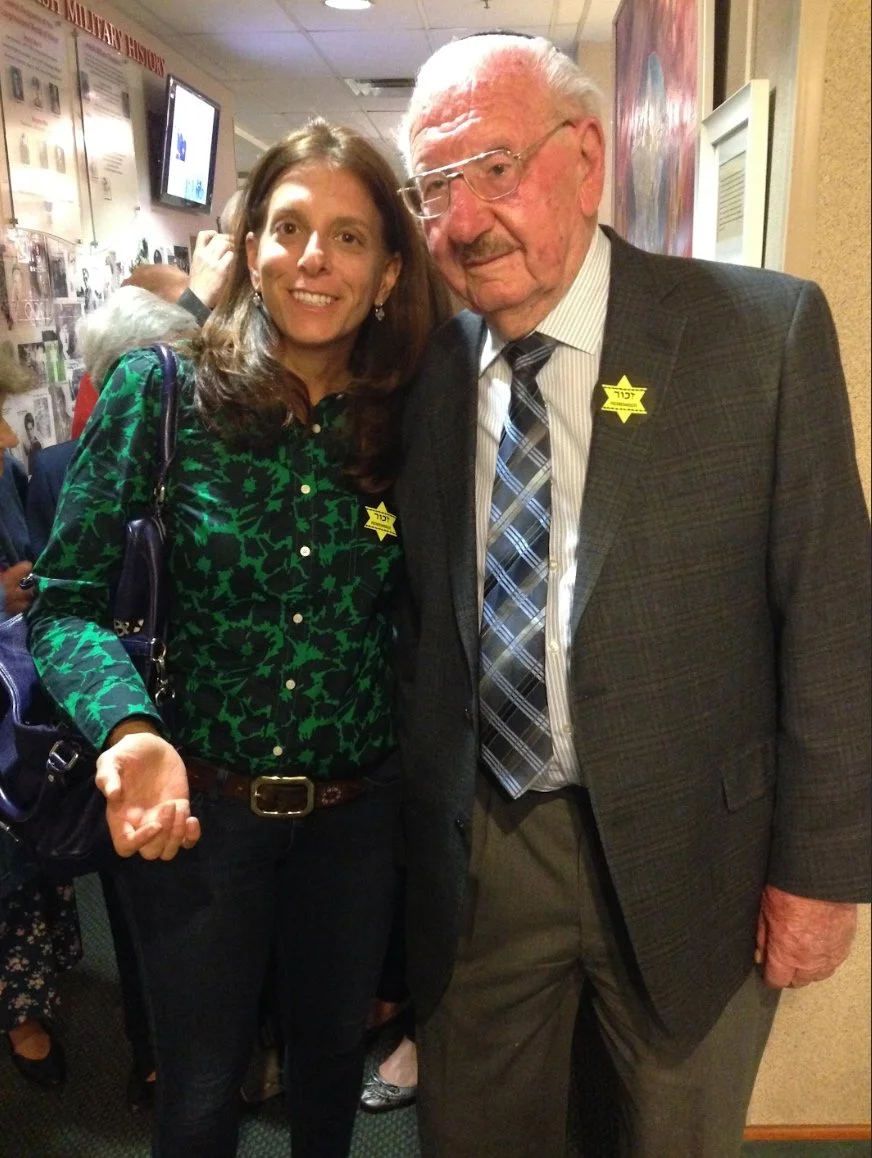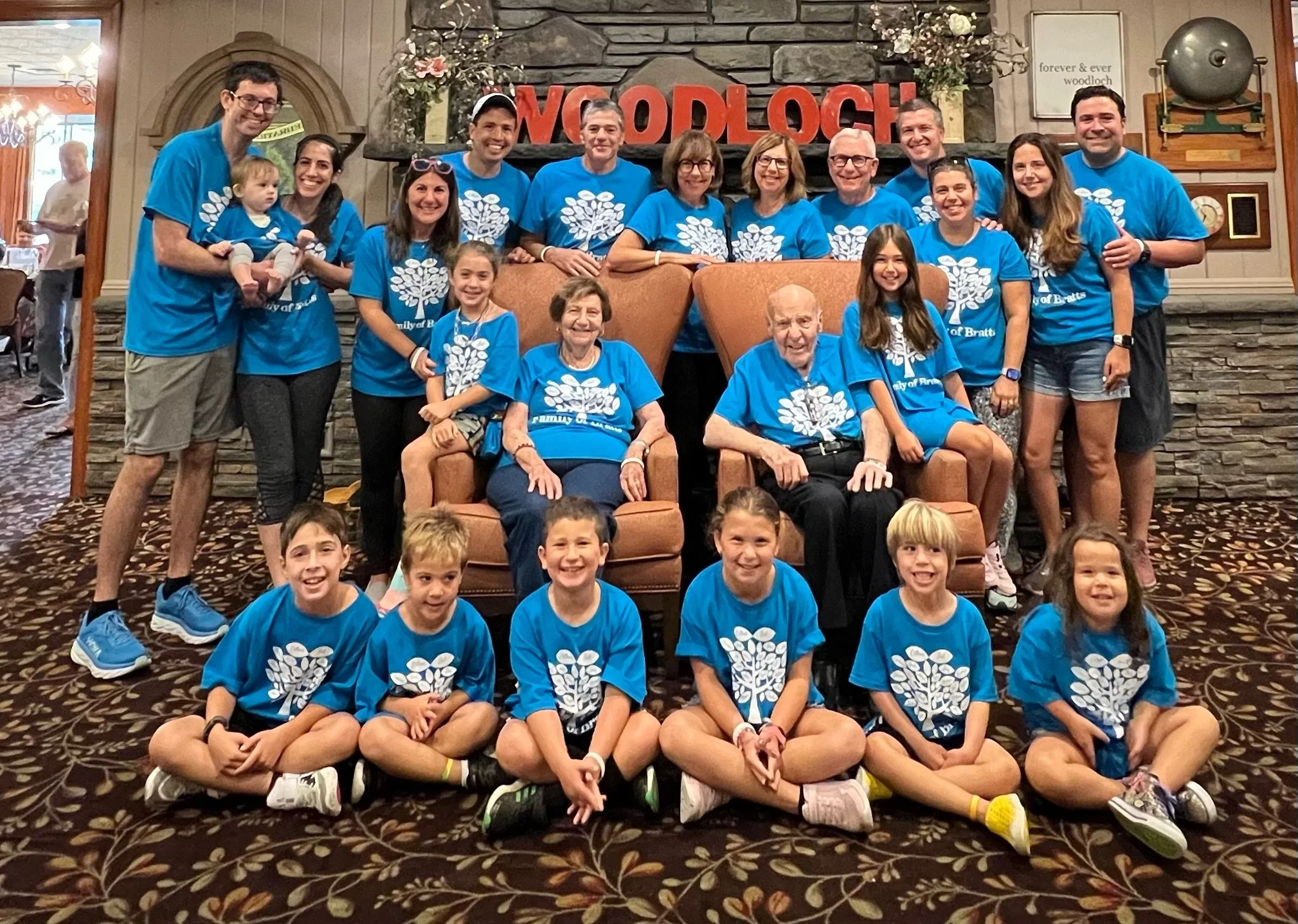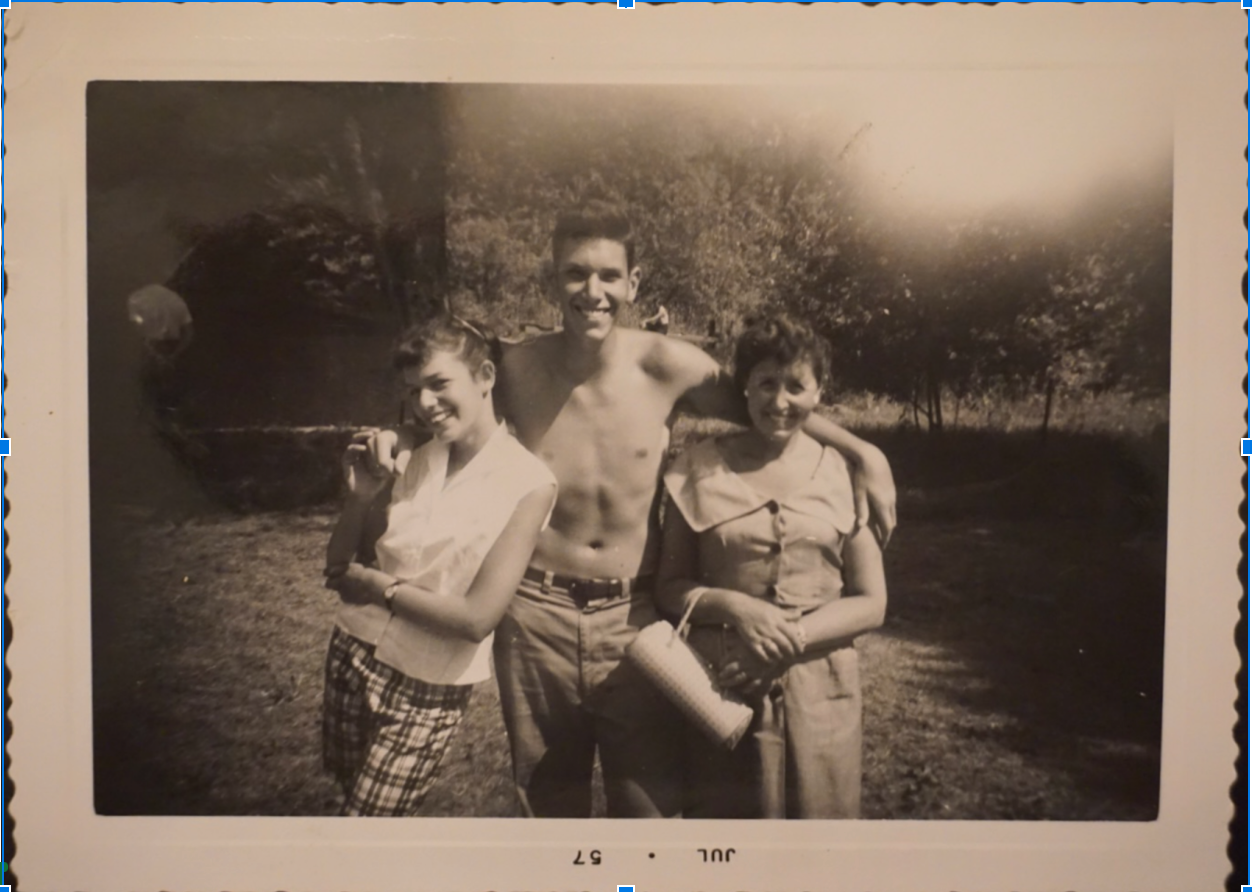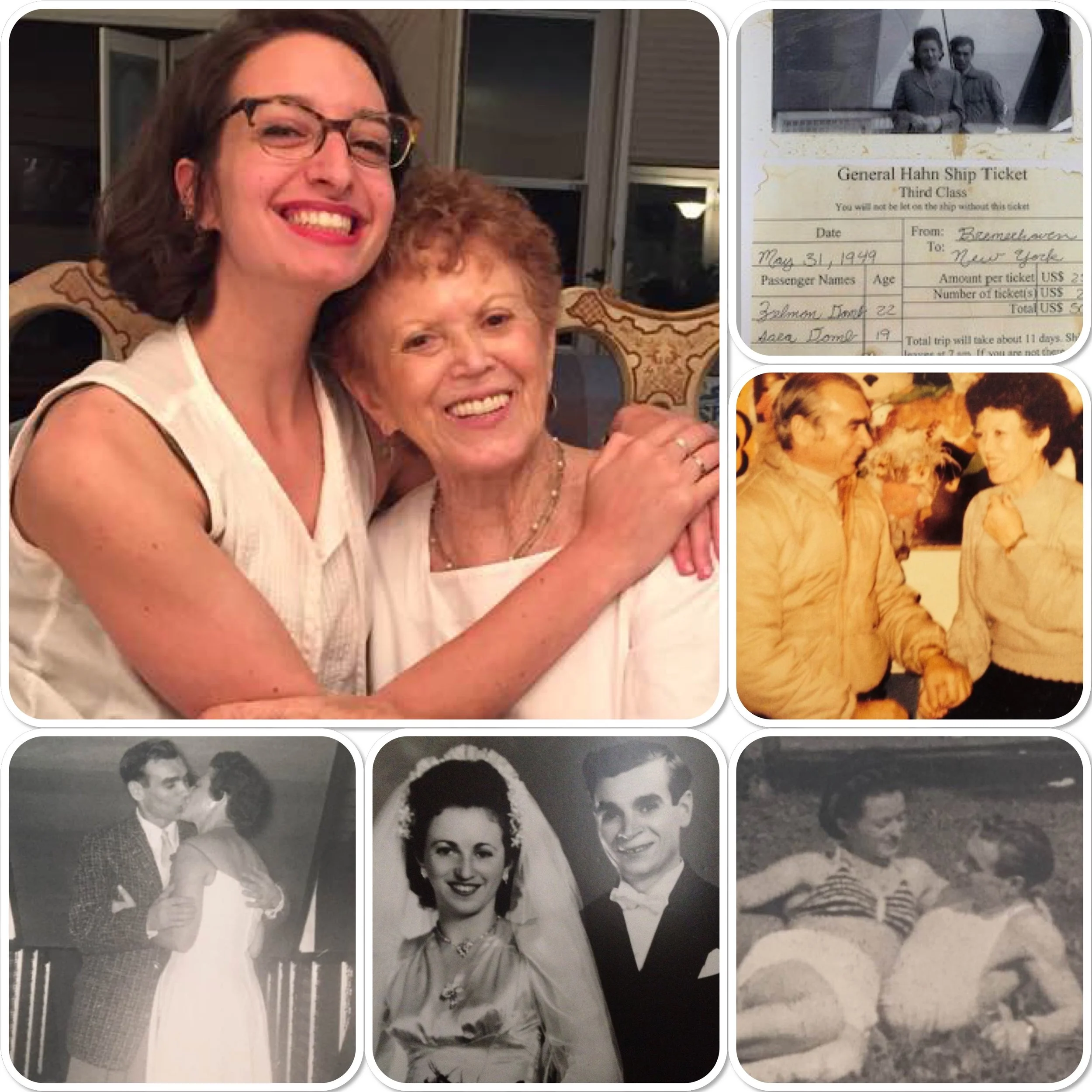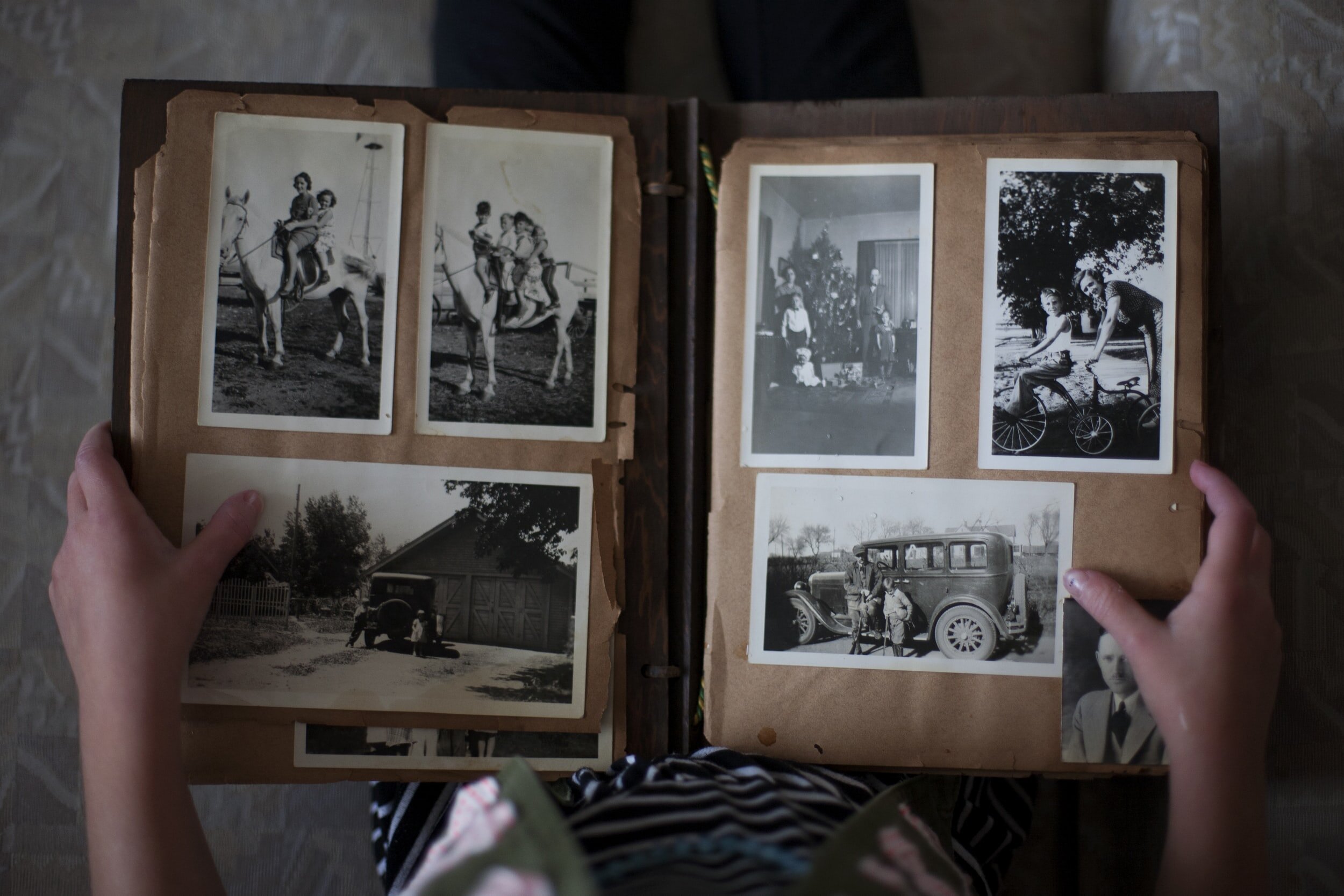
Our Families
Email 3GPhilly@gmail.com with a photo and a paragraph and we will post your grandparent’s story on our site.
Simon Birnbaum (Grandfather of Randi Stoopler)
June 1924-September 2017
Simon was born in Klobuck Poland and grew up in Czestochowa Poland until the Nazi invasion in the late 1930's. Simon was liberated in April 1945 from Auschwitz and settled for a few years in Germany where he married his wife, Dora. In 1949 Simon and Dora moved to Israel where they had their only daughter Tami. After almost 10 years in Israel the family moved to the US for family and opportunity. The family established roots in Southern New Jersey where their daughter gave Simon and Dora three grandchildren. Their grandchildren were their entire life. Simon wanted to make sure that no one will ever forget what he survived so he began sharing his life story with high school students. This became his passion and later transferred to his granddaughter, Randi Stoopler who currently shares his story today with students.
Esther and Sidney Bratt (Grandparents of Stacy Seltzer)
Esther Bratt My grandmother, Esther, was born in Vilna, Poland in 1929. After the Nazis invaded Vilna in 1941, she, her mother and father were forced in to the Vilna Ghetto. She spent the next two years living in daily fear with several sliding doors moments that could have ended her life. In 1943, she and her parents were transported from the Ghetto to HaKapeh Labor Camp where she worked sewing socks for the soldiers and where she witnessed unimaginable atrocities to men, women and children alike. Her father worked outside the labor camp where he befriended a non-Jew named Nicolai who offered to help how he could. As the Russians began to win the war and the Nazis began to scramble, she and her parents were able to escape from the Labor Camp and lived in Nicolai’s small cellar for two weeks through the bombing in Vilna. Ultimately, they were liberated and spent the next two years in a variety of Displaced Persons camp throughout Europe. They arrived in the United States in 1946 where she then met her husband, Sidney.
Click here to hear Stacy and Esther share Esther’s story through 3GNY Stories Live.
Sidney Bratt My grandfather, Sidney, was born in Guttstadt Germany in 1928. He was the oldest of four children. Guttstadt was a small town with a very small percentage of Jews living there. In 1937, he remembers things started to change as restrictions were placed on Jewish families. His family had fought for Germany in World War I and they couldn’t imagine leaving their own country. On November 9, 1938, my grandfather watched in horror as they burned his synagogue during Kristelnacht, the night of shattered glass. His father and all of the adult men in his family were arrested that night and taken to a local prison. My great-grandmother learned about an organization that was taking Jewish children to England called Kindertransport. She applied to get immigration papers and exit visas for her family but was told she could only send one child. She chose my grandfather because he was the oldest. He was only ten years old. My grandfather remembers packing a small suitcase. As he boarded the train his mother told him, “You lead the way, we’ll follow you. We’ll see you in England.” He boarded the SS Washington Ship to England, speaking no English and missing his family terribly. While in England, he learned that his father was being held as a prisoner of war on the Aisle of Man (an island between England and Ireland). My grandfather lived at Barham House in Ipswich for close to a year before being transferred to the Clayton Farmhouse about 20 miles northeast of London followed by the Polton House. In 1945, at the age of seventeen, my grandfather was reunited with his father in London. They never learned what happened to his mother or siblings. He and his father arrived in the United States by boat in 1948 where he then met his wife, Esther.
Bertha Bruckner (Grandmother of Meghan Stevenson-Krausz)
Bertha Bruckner, was born in Deutschkreutz, a small town on the border between Austria and Hungary, just as her parents and grandparents had been. At the time she was born, it was part of the Austro-Hungarian empire, which her oldest brother Polde and father Moses would defend during WWI, but by her ninth birthday, she would be a citizen of the new Republic of Austria. She was the second-youngest of 9 and the youngest girl. They were a religious family, observing the laws of Orthodox Judaism. The family business was winemaking, and it did fairly well. That all changed in March 1938 when Nazi Germany annexed Austria. From one day to the next, Bertha and her family were no longer welcome in the community where they had lived for generations. They were forced to flee to Vienna. Her older siblings were all married and had families. But she and her younger brother Bela, who at one point had harbored hopes of becoming a soccer star, crammed into a small apartment in Vienna with their parents. A far cry from the wide open skies and vineyards they were used to. Once in Vienna, the entire family started to plan their escape. According to family lore, her oldest sister Sara marched into Eichmann's office with her entire brood of children and told him he'd better give them all visas to Palestine or he'd be responsible for feeding them all. It worked. But Bertha was hoping to get to America.
My grandparents didn't marry for love. They married for survival. The rumor was that it was easier to get into the US if you were married, so when Bertha met Eugen at an underground gettogether, they promised that if one of them could get a visa to the US, then they'd get married and go together. Technically, they actually got married in order to apply - on Nov 8, 1938, the day before what would become known as Kristallnacht. But they only ever celebrated the anniversary of their later religious marriage in June, once Eugen got the visa. They were lucky. So lucky. They got visas, and so did Bela, Polde, and their wives. They sailed out of Bremen on July 21, and into the Port Of New York on July 27, 1939 as refugees. Of the 9 siblings, 6 survived. 3 were deported to concentration camps, where they were killed. Bertha's mother died of leukemia, before she could be deported. It feels odd to say, but I feel she was lucky too. Bertha's father, my great-grandfather, was deported on the second transport out of Vienna on Oct 19, 1941. We know that because of the Nazi's meticulous records. By that time, Bertha had given birth to both of her two children - my dad and his sister Annette. My dad was born July 10, 1940, almost one year after my grandparents arrived in the US.
This photo was taken on his 17th birthday with a self-timer using his new camera. It's one of my favorites, because of how joyful he, my Aunt Annette, and my grandmother look. It's a photo of people who are alive due to luck, and nothing else, and they are certainly making the most of it. I never knew my grandmother, but everyone always told me she was the kindest, sweetest woman. I tell her story, so that we remember all those who survived, as well as all those who didn't. If my dad had been born in Vienna as opposed to Pittsburgh, he probably would have been killed, and I wouldn't be here.
Carl and Matilda (Grandparents of Cindy Chronister)
Cindy grew up knowing her grandparents Carl and Matilda were born (1906 and 1910 respectively), raised and married in Vienna, Austria. What she didn’t know is how they fled Austria and what ultimately became of their families. A box full of letters, documents, and photos providing insight into their life in Vienna was found after the death of her grandmother. This archive of information was not explored until 25 years after their death. It wasn’t until Cindy’s family went to Vienna in 2019 to place memorial stones at the sites of her families’ former residences that this information was explored. This archive of information spans the period of right after the Anschluss to shortly after their arrival in the USA. This allowed Cindy to piece together her grandparents' story..
Shortly after the Anschluss, both families became increasingly concerned for their safety. As a result, Carl’s parents contacted a friend in NY to serve as sponsors for Carl and Matilda allowing them to emigrate to the USA. This sponsorship allowed Carl to apply to a refugee program organized by the same organization that organized the Kindertransport, The British Central Fund (now World Jewish Relief). Because Carl was between the ages of 18-35 and was trained as an electrician, he was fortunately approved for this rescue mission to Kitchener Camp which was located in Kent, England. Carl boarded a train with 136 other Jewish men from Vienna in March 1939 hoping to figure out a way to get his wife to join him once he arrived. Carl spent his early days at Kitchener utilizing his electrical skills, to help build the refugee camp that would soon be home to 4000 Jewish men. Although Carl was safe, he was not free to work or leave the camp for extended periods of time.
As a result of being one of the earliest refugees (#320/4000), he was only one of 100 men at Kitchener whose wives were able to join them. After Carl was able to ascertain a domestic position for Matilda, she joined him at Kitchener Camp in July 1939. Matilda first worked as a caregiver to children in an orphanage and then as a live-in nanny once she was pregnant. Carl and Matilda spent the next year at Kitchener awaiting their quota number to come up so they could board a boat to America. Because Matilda was pregnant with Cindy’s mother, the Jewish Aid Society became increasingly concerned regarding the timing of their passage and advocated for a rapid departure for Carl and Matilda. Carl and Matilda arrived in America in May 1940 and Frances was born in August 1940. Both Matilda and Carls’ parents were excited to learn they were grandparents and expressed hope that one day they’d meet Frances. In 1942, Carl’s family was deported to Sobibor and Matilda’s family to Treblinka.
Nathan Lewin (Grandfather of Stacy La Mell)
Nathan Lewin was born September 8th, 1922 in Lodz, Poland, to Fischel and Bluma Lewin. He had two younger siblings, Max and Chana Pyle, and a close-knit extended family. He was captain of his soccer team “Olympia.” He began a small lending library in Lodz with rare and handbound books, bought with his own money. His early life was filled with memories of happy holidays spent with family, music, and plenty of love. Germany invaded Poland on September 1st, 1939 and occupied Lodz within a week. By Nathan’s 17th birthday on September 8th, his life had changed forever. After being forced to burn his precious library, he was placed under the harsh curfew and restrictions for Jews. Nuchuum’s family already resided in the section of Lodz that would become the Lodz ghetto. As Jews were deported to Lodz, Nuchuum formulated his escape. After unsuccessfully begging his family to join, he left the ghetto with four friends on November 26th, 1939, hoping to reach the Russian side of the demarcation line. After months of hustling and struggling to survive, he eventually signed a work contract in August 1940 with the Soviet Union. He was sent to Magnitogorsk, working under harsh working conditions and performing backbreaking labor. There he was introduced to his future bride, Rachel. They were married shortly after in a simple ceremony in Russia. After the war, Nathan and Rachel traveled to Poland looking for loved ones and a chance to return to their former lives. After seeing there was nothing left for them in Poland, they were sent to a Displaced Person’s camp in Germany. It was here in 1947, eleven years after he had left his family, that Nathan reunited with his brother Max and learned the fate of his little sister and both of his parents. After one of the final deportations from Lodz, they had been murdered in gas chambers in the camps. Max and his new wife moved to the US, while Nathan and Rachel immigrated to the newly formed state of Israel. Their daughter Bluma (Betty, Stacy’s mother) was born in a DP camp in Israel in July 1949. After serving in the Israeli army for several years, Nathan moved his family to the United States in 1958, to reunite with his surviving family. They lived in and outside Chicago for the rest of their lives. Nathan often reflected “I never thought I would live to see another generation of Jews.” His last bit of advice for his grandchildren, told to his Shoah interviewer in 1995 shortly before his passing, was a cautionary inheritance of diaspora and survival: “They must always remember this, that they are Jewish.”
Sura Nermelstein and Zalman Domb (Grandparents of Sophie Don)
My Bubbie, Sura Nermelstein was born in Klechanov, Czechoslovakia in the Carpathian Mountains in January 1929. She learned Hungarian in school, and her family was observant orthodox. She was one of 7 children and her father was a kosher butcher. Bubbie learned about the Nazis in 1939 when she started to see changes at school. Starting in 1943 she was forced to wear a yellow star, and the following year on Passover were the first labor camp deportations in 1944.
Bubbie’s family was moved to the Muncasz ghetto where they lived in an 8x8 space in a factory with one meal a day. In May 1944 they were put on cattle cars for 2 days to Auschwitz. Bubbie was 15. In the selection, Bubbie and her older sister, Lily were separated from the rest of the family. When Bubbie asked where her family was sent, a woman pointed to the smoke of the crematoria. After 3 months, She and Lily were transferred to Stutthoff. There they collected bodies, but Lily’s knowledge of German benefitted her and she was able to work for the block captain and received extra food rations. Bubbie got sick but because Lily understood the Nazis’ German she was able to hide Bubbie from a surprise selection so she would not be taken to the gas chambers.
In April of 1945, they went on a death march from Proust work camp to a ship which the Nazis abandoned. Prisoners steered the boat to land and Lily and Bubbie were liberated by English soldiers on May 3, 1945. We celebrate this as her second birthday.
My Zayde, Zalman Domb, was 1 of 7, and was the only survivor of his family. As far as he knew, he was the only Jewish survivor of Ostykol, Poland. Zayde wrote a book about his life, Prisoner 83571.
In his book, he recalls the implementation of restrictive laws in December 1939, and in Summer 1941 he was taken to the Makow ghetto. During his time in the ghetto he was arrested for stealing food and sent to a penitentiary in Pultusk before being transferred to prison in Plock. There he was designated as a political prisoner with a red and green star. In the prison, he worked making baskets for 9 months and was then transferred to Birkenau in December of 1942. He was then taken to Auschwitz before moving on to Buchenwald, Ohrrdruf and finally Theresenstadt. He discovered the Nazis had abandoned the camp on May 5, and on May 8th the Russians liberated the camp. This was 1945.
Bubbie and Zayde met at a Displaced Persons Camp in Heidenheim Germany in their late teens. In 1949, they moved to the United States to be with Bubbie’s surviving family. They got married in Northeast Philadelphia and later opened Don’s Bakery. My Zayde passed away in 1991, just before I was born, and Bubbie is 93 and lives in Elkins Park.
Simcha and Miriam Shraga (Grandparents of Shana Weiner)
Shana’s maternal grandparents, Simcha, and Miriam Shraga (both of blessed memory) were born, married and had their eldest son, Sam (of blessed memory) in the Warsaw Ghetto in 1939. While the details are a bit uncertain, we know that they fled Poland, then under Nazi occupation, and found safety on a farm in the Soviet Union, where they waited out the war until liberation, having their second son, Aaron, in 1944. After liberation, they were transported to a Displaced Persons’ camp in Austria, where they had their daughter, Deborah (Shana’s mother) in 1948. In 1951 the family immigrated to the United States where they were settled in a tenement house in the Lower East Side with the help of “The Joint” (now “JDC”).
Simcha and Miriam both worked in a matzah factory, supporting their 3 children who struggled to assimilate in a refugee family. Simcha and Miriam’s 3 children gave them 5 grandchildren: Paul, Jonathan, Tovah, Michelle, and Shana (named for Simcha). Since their passing (1987 and 1993 respectively), they have 6 great-grandchildren to carry on their memory and legacy: Mia (named for Miriam), Carly, Stephanie, Rachel, Ava, and Harrison (named for Sam).
Lea and Beniek Singer (Grandparents of Allison Lindemann)
My grandmother, Lea Singer, passed away in 2019 surrounded by love from her three children, five grandchildren and five great-grandchildren. During the funeral and shiva period that followed (a time of mourning in the Jewish religion) our family and friends spent a great deal of time reflecting on her life's journey, in particular, her experience as a refugee in America in the early 1950s.
Lea was a Holocaust survivor born in Rustweczko, Poland, in the summer of 1924 and grew up in and near Mosciska, Poland (today part of the Ukraine). Her parents, sister, two brothers and many relatives died at the hands of the Nazis during WWII. tShe survived this period by hiding her faith while performing farm labor and attending Sunday mass services. As WWII ended with the Russian forces moving through this area, she and others came out of hiding, including her future husband, my grandfather Beniek Singer. My grandfather, Beniek, also had a remarkable story of survival. He hid with two of his brothers, a sister-in-law, and niece in the woods of Poland during the war under a barn floor. After my grandparents married in 1945, the couple decided to move away from the Russian occupation and established a home briefly in Munich, Germany, where their two daughters were born. They were among other refugees at a displaced persons camp known as Feldafing. Here they spent time planning their next move and future life - Would it be Israel? Canada? Cuba? Argentina? USA? Mexico? China? Who would allow them entry?
In 1949, the family immigrated to the United States, with the help of HIAS (Hebrew Immigrant Aid Society). They arrived in Brooklyn, New York by ship as many before them, and after some time in New York City found their way to their Walnut Road farm in Vineland, NJ. This move to Vineland began a new chapter in their life. They knew a few friends from Europe who had made the move to South Jersey and were comforted to know that other survivors, who were facing similar challenges, were arriving to this farmland at the time. Many in this refugee community initially became chicken farmers. Together they learned new languages and customs, met new neighbors of different faiths, made new friends and found a certain inner peace lost during their youth.
My grandparents settled into their new life and expanded their family with the birth of their son, my father Aaron Singer. From the stories I heard growing up, Lea's kitchen was always open for neighbors and friends to visit and enjoy a cup of coffee, slice of cake or a needed meal. She worked for some time at Newcomb Hospital and Palace Bakery. Educating their children was a most important priority.
My grandfather was not well in the years following the war and passed away in 1984 when I was in first grade. After his passing, my Bubby Lea began talking about some of her Holocaust-era experiences.


